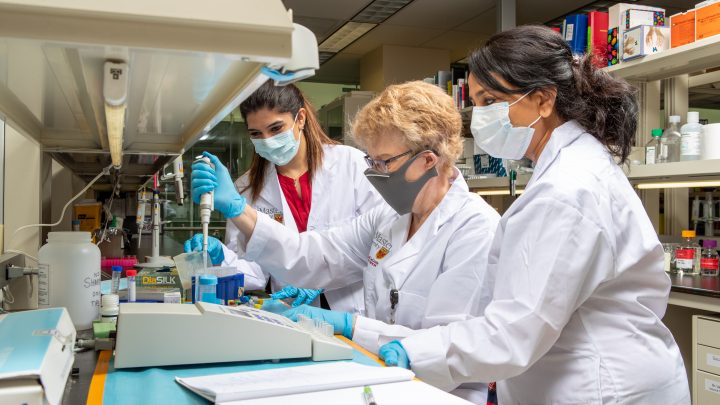Expandable List
Requirements
At the MSc level the candidate must complete, with at least a B- standing, two 3.0 unit half courses (or 6.0 units total). One of these courses must be at least a one half, 3.0 unit, 700-level graduate course in Medical Sciences, usually lasting one term, and the other course can be another 3.0 unit graduate-level half course in Medical Sciences or any other Faculty (with approval from the Supervisory Committee and Assistant Dean of Medical Sciences). The candidate is also required to present a thesis, which embodies the results of original research. In a final oral examination the candidate will be required to defend the thesis.
The program encourages students who are making excellent progress with their project and who have a desire to continue onwards for a PhD degree, to consider transferring directly into the PhD program without defending an MSc. Generally, a student who wishes to transfer to the PhD program prior to the completion of a master’s degree will be expected to have completed the course requirements for the MSc (one full 6.0 unit course or two 3.0 unit half courses) with a minimum B+ average. If, however, the course requirements are not complete at the time that the student wishes to transfer (e.g. a desired 3.0 unit half course is not offered until the following academic year), then a letter seeking permission to proceed with the transfer should be sent to the Assistant Dean of the Medical Sciences Program and the student must submit a Petition for Special Consideration form to medsci@mcmaster.ca. The Graduate Officer will forward the request for special consideration to the Associate Dean of Graduate Studies (Health Sciences) for review and approval.
Students wishing to transfer should see section 2.1.3 and 2.1.4 of the Graduate Calendar under General Regulations.
Requirements
A candidate for the PhD degree must comply with the School of Graduate Studies Regulations for the Degree Doctor of Philosophy, including the completion of the equivalent of one half, 3.0 unit graduate course beyond the Master’s degree. This must be a 700-level 3.0 unit graduate half course (usually lasting one term) in Medical Sciences or other FHS/Faculty graduate program (with approval from the Supervisory Committee and Assistant Dean of Medical Sciences).
Candidates must also:
- Obtain at least B- standing in coursework.
- Pass a Comprehensive Examination before the end of the twenty-first month following the start of their doctoral studies at McMaster. The examination, which consists of a written and oral part, gives students an opportunity to demonstrate their ability to acquire information about major issues in biomedical sciences and to evaluate critically such information. The written component of the Comprehensive Examination is a Canadian Institutes of Health Research (CIHR)-style grant proposal. In the oral component of the Comprehensive Examination, the student is expected to provide reasoned arguments in support of his/her interpretation of the scientific area under study, to demonstrate his/her ability to use the information acquired to formulate a hypothesis, and develop an experimental plan that addresses the hypothesis, to rationalize weaknesses and strengths of the experimental approach. The student and supervisory committee will agree on a topic that is of interest and value to the student and merit independent study. Further information regarding the comprehensive examination is contained in the Medical Sciences Graduate Program Handbook (PDF), Purpose and Procedure booklet, which is available in the Medical Sciences Program Office, HSC-4H4.
- Present a thesis on an approved topic and defend the thesis at a final oral examination.
All graduate students in Medical Sciences are expected to present at least ONE research seminar during their M.Sc. and their Ph.D. studentships at McMaster.
Requirements
Students in the MD/PhD program will complete both the MD curriculum requirements (eligible for MD residency programs), and the PhD curriculum requirements in order to be eligible for particular academic placements across institutions. The program will seek to train individuals who will pursue research as a major priority and to prepare graduates for leadership roles in integrated research initiatives, particularly those involving interdisciplinary and translational health research endeavors. The program expects that McMaster MD/PhD graduates will contribute significantly to the need for clinician scientists in a variety of roles. The program admits up to 3 students on a yearly basis.
Horizontal clinical electives are encouraged during the 3-year research block following your pre-clerkship year. Horizontal electives can range from a half day of clinic each week, to on-call experiences on the weekends. These elective experiences may be in areas relevant to the student’s research area and final career direction. Further, the student may use these elective periods to enhance areas of clinical interest or to solidify knowledge and clinical skills. There are 24 weeks of block electives required by the MD program. Seven weeks are completed between MF4 and Integration Foundation blocks and the remaining 17 weeks are completed during clerkship. As noted above, those seven weeks are now combined with the Integration Foundation block. Fifty percent of the clerkship electives must be clinically oriented.
Candidates must successfully complete the equivalent of three 700-level graduate half courses, a comprehensive examination and the submission and defence of a research thesis (the research proposal should be completed as early as possible in the program).
All graduate students must also complete SGS 101 “Academic Research Integrity and Ethics” and SGS 201 “Accessibility for Ontarians with Disabilities Act (AODA)” courses.

